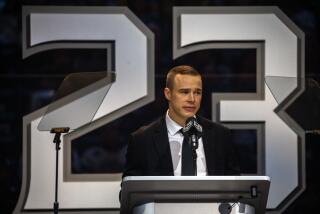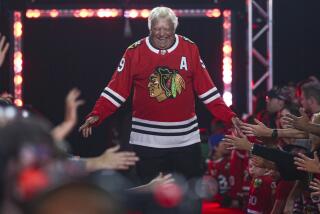Hockey Legend Dies
- Share via
Hockey Hall of Fame coaching legend Herb Brooks, the innovative architect of the 1980 U.S. Olympic “Miracle on Ice” victory against the Soviet Union at Lake Placid, was killed Monday in a traffic accident near Forest Lake, Minn. He was 66.
His minivan flipped at a highway intersection, according to an Associated Press report.
Brooks, who last season was the Pittsburgh Penguins’ director of player development, had been returning from a U.S. Hockey Hall of Fame charity golf tournament in northern Minnesota, apparently heading toward the airport to catch a flight to Chicago, when the one-car accident occurred just north of the Twin Cities.
Brooks was considered a man ahead of his time in hockey circles, having paved the way for Americans to succeed in the NHL behind the bench and on the ice, in what had largely been a Canadian game.
Before the 1980 Olympics, when Brooks guided a group of unheralded amateur players past a Soviet powerhouse en route to the gold medal, American hockey was rarely taken seriously on the international stage.
“At all levels of the game, including college hockey, Olympic hockey and the National Hockey League, Herb Brooks was a consummate teacher, an unparalleled motivator and an unquestioned innovator,” NHL Commissioner Gary Bettman said.
“The strength of hockey in the United States is a testament to Herb Brooks and the historic Olympic triumph in 1980. However, there was so much more to him than that glorious moment at Lake Placid. Herb was a tireless supporter of USA Hockey players and programs, a relentless advocate of the speed and beauty of our game.”
Brooks spent the last day of his life among lifelong friends from the hockey community. Minnesota Wild radio broadcaster Tom Reid had breakfast with Brooks on Monday morning before the golf tournament.
Reid said that NHL Hall of Famer Bobby Hull stood up the night before and talked about the Miracle on Ice moment, having heard the famous Al Michaels call (“Do you believe in miracles? Yes!”) at the Hall of Fame, and the night turned into something of a tribute to Brooks.
Reid, a former defenseman for the Minnesota North Stars, happened to drive by the crash site with Wild scout Glen Sonmor, who had known Brooks for 47 years, less than two hours after the accident.
“I can’t describe how I felt,” Reid said. “I can’t tell you how big a loss this is, not only for the state, but the hockey community. He was a very innovative individual with strong beliefs and that’s why we were able to win the gold medal in 1980.”
Said Sonmor: “I still think he’s the greatest hockey coach I’ve ever come across.”
Though he gained international fame after the stunning Olympic semifinal upset of the Soviets and subsequent gold medal in 1980, and went on to coach four NHL teams, the St. Paul-born Brooks remained a symbol of Minnesota pride.
“My gut reaction is Minnesota lost its head coach today. Herb Brooks was a Minnesota legend, a Minnesota treasure,” Minnesota Gov. Tim Pawlenty said.
The defining moment of Brooks’ career almost never happened. The former Olympian who coached at the University of Minnesota, leading the Gophers to three titles in the 1970s, wasn’t even the first choice to lead the U.S. team in 1980. But USA Hockey President Walter Bush was impressed with Brooks’ attention to detail.
Brooks cleverly pressed all the right buttons with his Olympians, uniting the collegiate players. They banded together -- against him -- and became a tight unit in the days leading up to Lake Placid. The country, suffering through a difficult economic time, rallied behind them in a moment of national pride.
Their 4-3 victory over the Soviets was a genuine shock since the Soviets had defeated the U.S., 10-3, in the final tuneup before the Olympics.
“The whole thing was at the time, our socioeconomic climate,” Brooks told The Times in an interview in 2000. “It’s been said anyway that we were all a little frustrated. The economy was in a funk. The Afghanistan situation, one or two other variables. The country was not feeling too good about themselves and this was kind of a catalyst....
“The whole thing was a reminder given to us by a bunch of college kids that it’s not a quick-fix mentality.”
Brooks inspired his players before the semifinal against the Soviets with these words: “You were born to be a player. You were meant to be here.”
The players responded and then some. Incredibly, the Soviets pulled famed goaltender Vladislav Tretiak after the second period.
Captain Mike Eruzione’s third-period goal gave the Americans a 4-3 lead, and they clung to it for the final agonizing 10 minutes. The game was not shown live on national TV, and sports fans in certain parts of the country had to rely on friends holding the phone up to the radio.
Brooks briefly let his guard down with his team, and then got back to business.
“Thinking back on what he meant to us, he was our coach and our friend,” Eruzione said Monday. “As difficult as he was to play for, he had a love and passion for us. We never truly understood how much he cared for us until after the Games were over.”
He said they probably would not have defeated the Soviets, and then Finland in the gold medal game, without Brooks.
“I’ve said before, I don’t think we could have won without him and he couldn’t have won without us,” Eruzione said. “But he made the selections, he put the program together.”
Asked what it was like to play for Brooks, Eruzione said: “The guy was crazy. He was very, very demanding, very difficult to play for, but he was like your dad. You love your dad because he’s your dad, but sometimes you hate your dad. We hated him because he was so demanding. But now when I look back at our team, everybody has turned out pretty good, the things they’ve done.”
After 1980, Brooks went on to coach four NHL teams, the New York Rangers, Minnesota North Stars, New Jersey Devils and the Penguins. He completed his U.S. Olympic circle by returning to coach the 2002 team to a silver medal in Salt Lake City. The 1980 Olympic team reunited at the NHL All-Star game in 2002 in Los Angeles.
“He clearly had some unfinished business,” Eruzione said. “I think he wanted to coach again. I know he did. He thought the Rangers job was going to be his [again], and I think he thought about the possibility of heading USA Hockey. That’s the sad thing for me.”
Lou Nanne, who was Brooks’ boss with the North Stars, confirmed that Brooks wanted to coach again.
“I met with him a couple of weeks ago in my office,” Nanne said Monday night. “He wanted to coach again, and I told him, ‘Herbie, you’ve got to start having fun. We’re all getting older and you’ve got to start enjoying life.’ He said, ‘Oh I’m fine.’ ”
Brooks is survived by his wife Patti, of Birchwood, Minn., and a son and daughter.
*
(BEGIN TEXT OF INFOBOX)
Good as Gold
Herb Brooks’ NHL coaching record:
REGULAR SEASON
*--* Year, Team W L T Pct 81-82 NY Rangers 39 27 14 575 82-83 NY Rangers 35 35 10 500 83-84 NY Rangers 42 29 9 581 84-85 NY Rangers 15 22 8 422 87-88 Minnesota 19 48 13 319 92-93 New Jersey 40 37 7 531 99-00 Pittsburgh 29 23 5 570 Total 219 221 66 497
*--*
PLAYOFFS
*--* Year, Team W L Pct 81-82 NY Rangers 5 5 500 82-83 NY Rangers 5 4 556 83-84 NY Rangers 2 3 400 92-93 New Jersey 1 4 200 99-00 Pittsburgh 6 5 545 Total 19 21 475
*--*
* HONORS: Three NCAA championships as head coach of Minnesota, 1974, 1976 and 1979; gold medal as coach of U.S. Olympic team, 1980; inducted into U.S. Hockey Hall of Fame, 1990.
* PLAYING CAREER: University of Minnesota, 1955-59; U.S. Olympic team, 1964, 1968.
* COLLEGE COACHING: University of Minnesota, 1972-79; St. Cloud State, 1986-87.
* OLYMPICS COACHING: United States, 1980, 2002; France, 1998.
*
Staff writers Chris Foster and Robyn Norwood and Associated Press contributed to this report.
More to Read
Go beyond the scoreboard
Get the latest on L.A.'s teams in the daily Sports Report newsletter.
You may occasionally receive promotional content from the Los Angeles Times.







